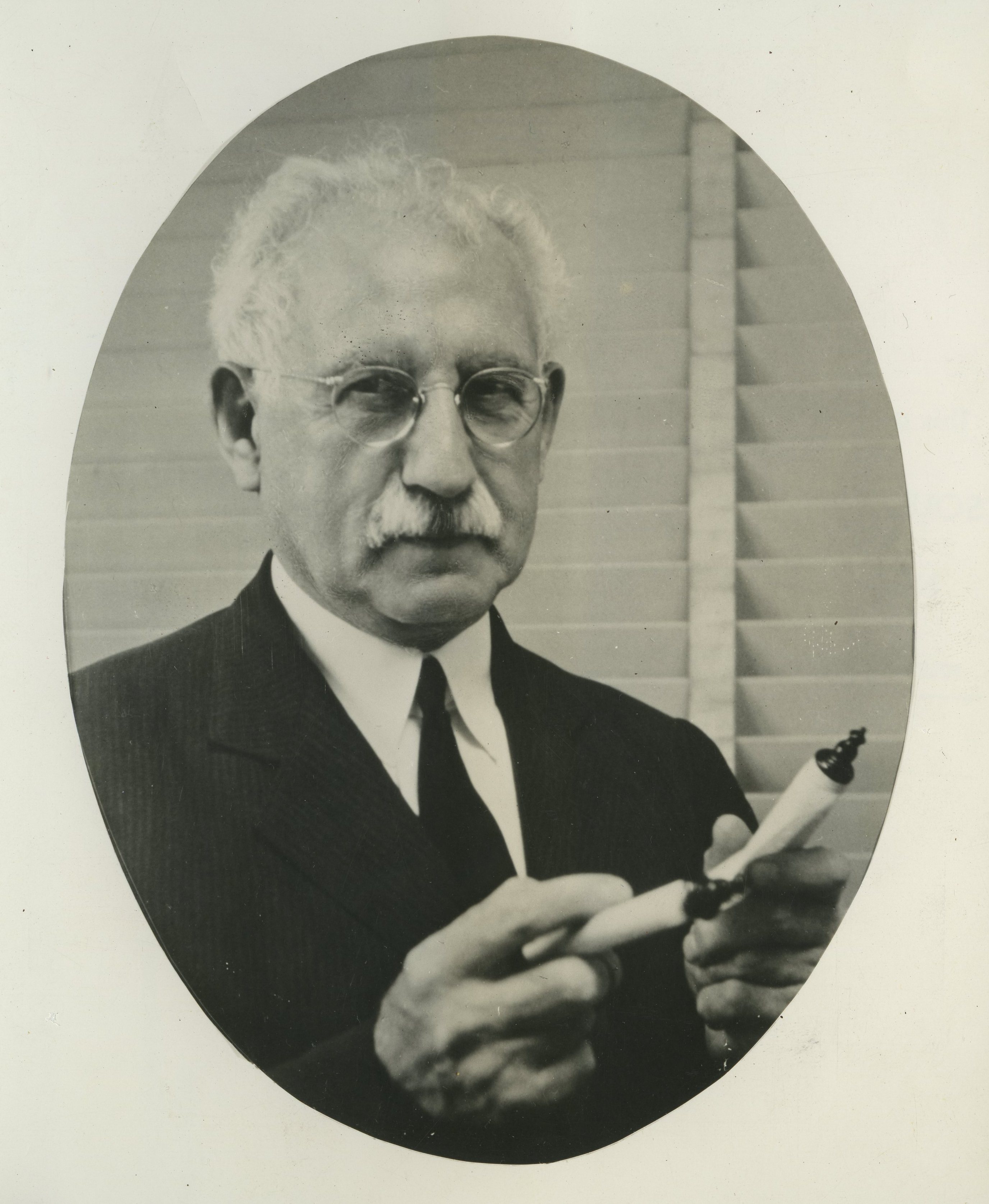F.C. Gilbert
(1867 - 1946)
 |
Frederick Carnes Cohen was born in London, England, on September 30, 1867, to Falk and Miriam Cohen, both of Jewish ethnicity and strict adherents to Orthodox Judaism. Before Frederick’s birth, the Cohens had fled Poland and Germany due to anti-Semitic persecution, and had at last settled in England during the time of Benjamin Disraeli’s first tenure as Prime Minister.
Frederick was raised as a strict Orthodox Jew, at one time entertaining the idea of becoming a rabbi. In 1886, shortly after his father died, Frederick immigrated to New York City – which he called “this great Jewish metropolis of the world.” It was there that he is believed to have changed his surname to Gilbert.
After a spell in New York, Gilbert relocated to Boston at the behest of a labor organization, and there happened to board with a Seventh-day Adventist family called the Fiskes. Previously expressing an animosity for Christianity, Gilbert was moved by the warmth he experienced from the Fiskes. Gilbert was baptized a Seventh-day Adventist in 1889, one of only a handful of Jewish converts to the denomination since its inception in 1863.
After his conversion, Gilbert began selling Christian literature and soon earned a degree in religion from what is now Atlantic Union College. In the summer of 1894, with the financial and moral backing of the Adventist Church – Adventists believe that Jews are their spiritual forebears and share with them a reverence of the seventh-day Sabbath and the centrality of the sanctuary service – Gilbert embarked upon a public ministry to win the 20,000 Jews of Boston to the Adventist faith. Gilbert’s methods were innovative and unheard of among Adventist ministers: he preached in Yiddish in open air meetings, engaged in public debates with rabbis, and published his writings geared to the “Jewish mind” in tract form. According to his accounts, he suffered considerable opposition, Boston Jewry considering him a traitor to his people, as did his own family. For a time Gilbert ministered among the Goyim.
In 1896, Gilbert married Ella May Graham, a woman with a rich Adventist heritage, and the couple had two daughters and two sons. Gilbert continued to preach in New England, eventually turning his effort to Jewish people again. He published a series of hefty, sophisticated monographs that provided deep insights into the Old Testament and Jewish history, culture, and tradition, and their links to Christianity. The uniqueness of his works can be seen in the moniker he printed under his name on the title page: “A Hebrew Christian.” Many of his works are now considered classics by Seventh-day Adventists: Practical Lessons from the Experience of Israel for the Church of To-day (1902), From Judaism to Christianity and Gospel Work Among the Hebrews (1911), and Messiah in His Sanctuary (1937).
In 1906, Gilbert began the Jewish Mission in Boston, then the largest project by Adventists geared to proselytize the Jewish people. The Jewish Mission performed numerous functions in the Jewish neighborhood, its residents mostly from Russia. The Mission held religious meetings, both inside and open air, in which Gilbert lectured on Bible topics and Jewish history; held Sabbath School and church services; provided medical care; took in orphans; fed the poor; offered sewing classes; published Gilbert’s tracts and a monthly magazine, The Good Tidings of the Messiah; and distributed literature. The number of actual converts to Adventism was small, but the social services were significant. Gilbert’s ministry to the Jews was wholeheartedly and vocally supported by Ellen G. White (1827-1915), church cofounder and prophetess.
From 1907 to 1922, Gilbert was founder and director of the church’s Jewish Department, an administrative office tasked with evangelizing the Jewish population in the United States. In 1922, Gilbert was voted the Seventh-day Adventist Church’s first general field secretary, an officer who was a kind of working diplomat to the global membership. In this position Gilbert travelled around the world as an Adventist ambassador, always with an eye on the Adventist efforts to Jews.
F.C. Gilbert died on a Sabbath morning, August 31, 1946, aged 78, in his home just outside of Washington, D.C. Of his 55 years of service to the Adventist Church, the church’s highest committee said of Gilbert upon his death, “He was an earnest, devoted worker, counting no task too arduous to undertake.”
Benjamin Baker, PhD, teaches writing at the University of Maryland.
Sources: Frederick Carnes Gilbert Papers. Personal Collection 2. General Conference Archives, Silver Spring, Maryland;
F.C. Gilbert, From Judaism to Christianity and Gospel Work Among the Hebrews, (Good Tidings Press, 1911);
“Obituaries – Gilbert.” Adventist Review, vol. 123, no. 46, (September 26, 1946);
Jonathan D. Sarna, The Jews of Boston, (New Haven, CT: Yale University Press, 2005).
Photo: General Conference of SDA Archives.


